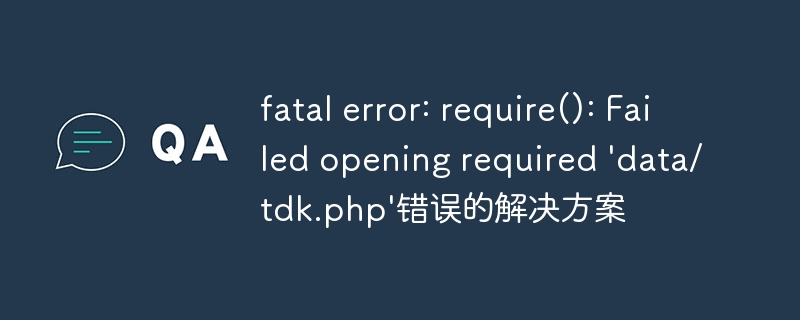Home >Backend Development >PHP Tutorial >Fatal error: require(): Failed opening required 'data/tdk.php' error solution
Fatal error: require(): Failed opening required 'data/tdk.php' error solution
- PHPzOriginal
- 2023-11-27 08:24:111519browse

In the process of website development, we often encounter various error prompts, which are similar to "fatal error: require(): Failed opening required 'data/tdk.php'" Such error messages are relatively common. This error message means that PHP cannot find the file in the specified path, causing the require function to fail to execute. This article will describe how to solve this problem through a series of solutions.
First of all, we need to understand what the require function is. require and include are two keywords used by PHP language to reference files or module code. When the require statement is executed, it will search whether the file exists in the specified path. If it is found, the file content will be read out and the require position will be replaced. Otherwise, it will result in something like "Fatal error: require(): Failed opening required 'data/tdk" .php'" fatal error.
Next, let’s take a look at several possible causes of this error and the corresponding solutions:
- The file does not exist or the file path is wrong
If you use require to introduce a non-existent file or the file path is filled in incorrectly, it will result in an error similar to "Fatal error: require(): Failed opening required 'data/tdk.php'". At this time you need to check whether the path is correct and ensure that the imported files and paths actually exist.
- File permission issues
If the imported file permissions are incorrect, for example, there is no read permission, it will result in something similar to "Fatal error: require(): Failed opening required 'data/tdk.php'" error. At this time you need to check whether the file permissions are correct and ensure that the imported file has read permissions.
- File encoding issues
If the encoding format of the file you introduce is incorrect or different from the encoding format of the current script, it will result in something similar to "Fatal error: require( ): Failed opening required 'data/tdk.php'" error. You can solve this problem by converting the file into the correct encoding format or adding a header at the beginning of the script to specify the encoding format, for example:
header("Content-type:text/html;charset=utf-8");- File path case problem
The path is case-sensitive in Linux systems, but not in Windows systems. If you develop under a Windows system, write the file path in lowercase letters, but when executing on a Linux system, due to the path case mismatch, it will result in a message similar to "Fatal error: require(): Failed opening required 'data/ tdk.php'" error. At this point you need to check that the case of the file path matches correctly.
- PHP version problem
If you use the new features in PHP7 in PHP5, such as using the null value merging operator??, it will cause something like this For errors like "Fatal error: require(): Failed opening required 'data/tdk.php'". Solving this problem requires you to upgrade your PHP version.
Summary: An error message similar to "Fatal error: require(): Failed opening required 'data/tdk.php'" means that PHP cannot find the file in the specified path, causing the require function to fail to execute. Through the series of solutions introduced in this article, you can easily solve the problem of imported files and make your website run normally.
The above is the detailed content of Fatal error: require(): Failed opening required 'data/tdk.php' error solution. For more information, please follow other related articles on the PHP Chinese website!

